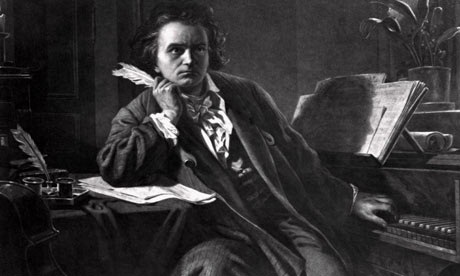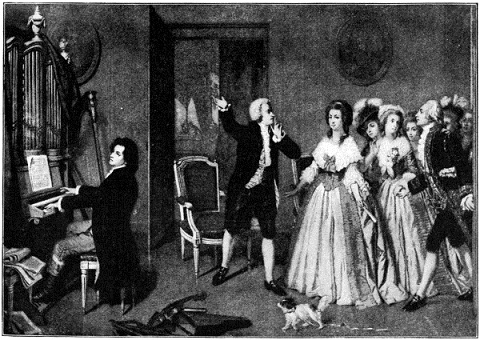Ludwig van Beethoven was born onDecember 17, 1770 died March 26, 1827, was a German classical composer but lived most of his life in Vienna, Austria. Beethoven is a composer who has a great influence on the world’s romantic music because of his profound impact on many later composers, musicians, and audiences.

Beethoven was born into a family with a musical tradition, his grandfather was the conductor of the court orchestra in Bonn. His father, Johann Van Beethoven, was a Terno singer in the royal church in Bonn and knew how to play the Piano and Violin. Her mother, Maria Magdelena Keverich, was the daughter of a royal chef, a gentle and hard-working person. However, Beethoven’s family was not very happy, because father Johan often got drunk and beat Beethoven and his mother.
From an early age, Beethoven showed his outstanding musical talent. Beethoven’s father wanted the boy to become like musical prodigy Wolfgang A. Mozart, so he decided to let him study music and locked him in his room for many hours to learn the piano and violin. Although he was abused by his Father and forced to study music, Beethoven did not hate music but instead saw music as a way to escape from a sad life.
At the age of 5, Beethoven suffered from otitis media, but his parents did not know about it and did not receive proper treatment. This may be the reason that Beethoven later became deaf.
At the age of 6, Beethoven performed in front of an audience but did not make a splash.
In 1781, at the age of 11, Beethoven performed piano in the Netherlands as a true pianist. During this time, he was appointed as assistant organist in the synagogue in Bonn
In 1782, Beethoven became Neefe’s representative at the royal orchestra as an organist.
At the age of 14, Beethoven won an official position as an organist in this orchestra

When Beethoven’s fame was rising in the late 1970s, he unfortunately gradually lost his hearing ability, turning Beethoven into a skeptical and hot-tempered person. Beethoven was completely deaf until the end of his life, but he still played music with his passion and enthusiasm because according to him music was the way to escape all suffering.
Beethoven’s works completed between 1803 and 1805 far surpass what he composed before. It is the Kreutzar Sonata (1803) written for violin and piano. The epic Symphony No. 3 (1804) has a strong appeal and deep emotion. He initially dedicated it to Napoleon , but when Napoleon ascended the throne , he tore up the dedication. The Piano Sonatas, Dawn ( 1804 ) and Appassionta (1805), Symphony No. 4 ( 1806 ), Symphony No. 5 Destiny ( 1808 ) all have great artistic value.
He wanted to portray in sound a life in struggle with death with a terrible force that finally triumphs, like the female character in the Opera Fidelio (1805) trying to protect her husband. I fight against evil and brutality, and in the Missa solemnis is a prayer for liberation from the pain of war.
Looking at Beethoven’s career, people often mistakenly think he had a fulfilling life, but few people know that Beethoven encountered a lot of unhappiness in love and physical pain.
In the last years of his life, despite being completely deaf in both ears, Beethoven still composed “Symphony No. 8” (1818) while often wandering the streets in a pitiful manner. Meanwhile, Beethoven’s brother passed away, leaving behind a son named Charles, whom Beethoven raised. Charles was a mischievous child, with many bad habits, lying, and being young and addicted to alcohol.
During this time, the excellent works Symphony No. 9 , the solemn Ceremony , and the final sonatas : Piano Concerto and Quartet were born one after another. In Beethoven’s entire legacy, these works stand out the most, mainly because they went beyond the classical traditions with their free expression of different moods of the inner world.
Boring life continues. In 1826, Beethoven returned to live with his brother Johann, to enjoy some fresh air, but in November of that year, Beethooven was urgently called back to Vienna, because his nephew was arrested by the Vienna police.
Beethoven hitched a ride on a milkman’s cart to Vienna. Seeing the cold weather, his health was exhausted at this time, the artist shivered from the cold and had difficulty breathing. Beethoven spit out gobs of blood. Charles, the unfortunate nephew, didn’t bother calling the doctor. On January 5, 1827, Beethoven announced that he would leave all his inheritance to his grandchildren. The doctor informed the musician that death was near. Beethoven was not sad. On the contrary, he felt relieved and declared to his friends: “Please clap your hands! The tragedy has come to an end!” .
At 6 p.m. on March 26, 1827, the most famous musician of the 19th century breathed his last. His funeral had thousands of mourners, and the next day all of Beethoven’s possessions, including manuscripts, were auctioned off. All fell into the hands of two book publishers, merchants Gaflinger and Actari, at dirt cheap prices.





